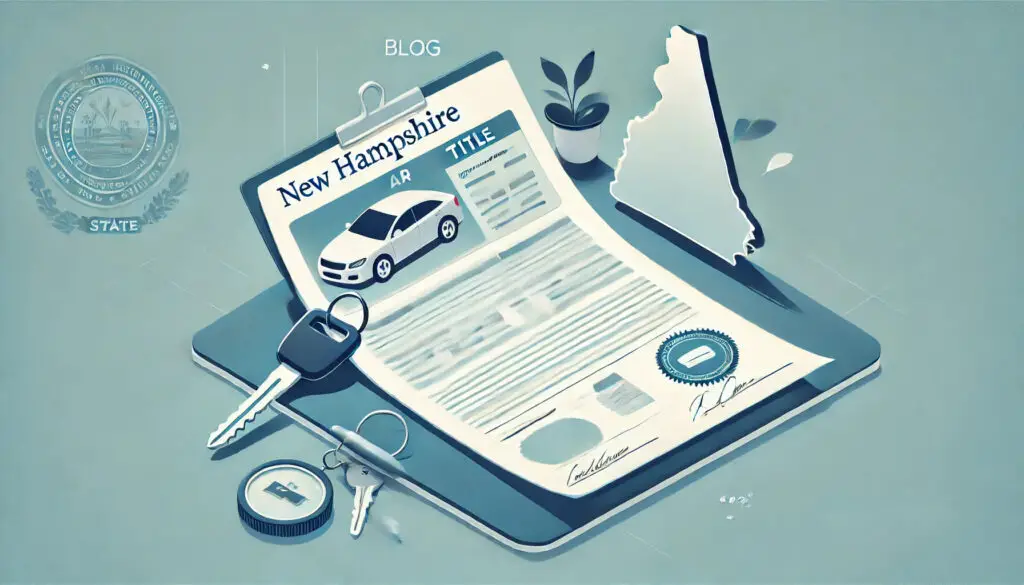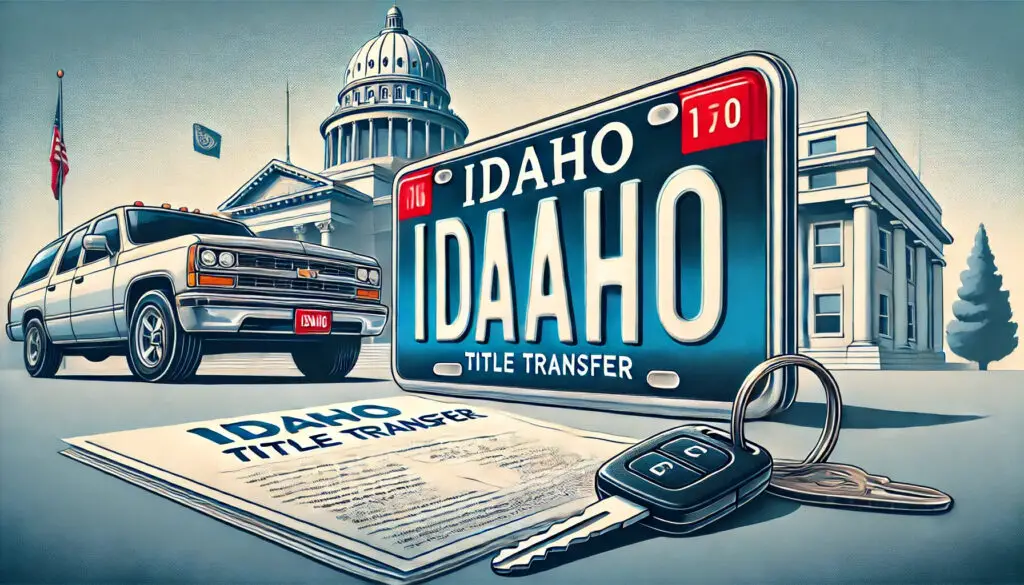Transferring a vehicle title in New Hampshire can seem like a complex process, but it becomes manageable with the right knowledge and proper preparation. Whether you are buying a car from a private seller or handling a transfer for an out-of-state vehicle, understanding the steps and required documentation is essential to ensure a smooth transaction.
Importance of Proper Vehicle Title Transfer in New Hampshire
Title transfer is a critical legal process that officially shifts the ownership of a vehicle from one party to another. In New Hampshire, as in other states, it is vital to complete the title transfer correctly to avoid future legal issues, such as improper registration, fines, or delays in obtaining registration.
Step-by-Step Process for Vehicle Title Transfer in New Hampshire
1. Understanding the Vehicle Title Transfer Process
A vehicle title is a legal document that proves ownership of a vehicle. When buying or selling a car in New Hampshire, a title transfer is required to reflect the change in ownership. This process ensures that the new owner can legally register and use the vehicle.
When Title Transfer Is Required
You must transfer the title when buying or selling a vehicle, inheriting a vehicle, or changing ownership for any reason. The transfer of ownership should occur before the new owner attempts to register the vehicle.
2. Gather Necessary Documents for Title Transfer
Before visiting the local Town or City Clerk’s office, ensure you have all the required documents in order. The following paperwork is essential for the title transfer:
2.1 Completed Title Certificate
The seller must sign the title certificate in the appropriate section to transfer ownership. This step is essential for making the title legally binding. Ensure that the seller has filled out all required fields, including the odometer reading.
2.2 Bill of Sale
A bill of sale is necessary to validate the transaction and protect both parties legally. The bill of sale should include the vehicle’s make, model, year, Vehicle Identification Number (VIN), purchase price, and the names and signatures of both the buyer and the seller.
2.3 Proof of New Hampshire Residency
Proof of residency is required to verify that you live in New Hampshire. Acceptable forms include a valid New Hampshire driver’s license, utility bill, or voter registration card. This ensures that the transaction complies with state requirements.
2.4 Odometer Disclosure Statement
An Odometer Disclosure Statement is a federal requirement for certain vehicles. This document discloses the vehicle’s mileage at the time of sale. Both the buyer and the seller must sign this form to confirm that the odometer reading is accurate.
2.5 Proof of Car Insurance
New Hampshire law mandates that all vehicles be insured before registration. You must provide proof of liability insurance coverage, either through your own insurance company or via an insurer authorized to operate in the state.
2.6 Emissions Test (If Applicable)
If the vehicle requires an emissions test, it must be completed before the title transfer can occur. Some vehicles, based on their age and type, may be exempt from emissions testing. Check with your local DMV or clerk’s office to verify the emissions requirements for your vehicle.
3. Visiting Your Local Town or City Clerk’s Office
Once you’ve gathered all the necessary documentation, your next step is to visit the local Town or City Clerk’s office to submit your paperwork and complete the title transfer.
3.1 Submitting Required Documents
Ensure that you bring all completed and signed forms to the clerk’s office. Double-check the documentation before submission to avoid delays. The clerk will review your paperwork, verify your identity, and ensure that all required fields are filled correctly.
3.2 Paying Fees for Title Transfer
There are fees associated with the title transfer and vehicle registration. Fees vary depending on the vehicle’s weight and type, so it’s advisable to check in advance. Accepted payment methods usually include cash, check, or credit/debit card.
3.3 Obtaining New License Plates
After the title transfer is approved, you will be issued new license plates for your vehicle. If you wish to keep your old license plates, check with the clerk’s office to see if they can be transferred to your new vehicle.
4. Special Considerations for Title Transfers
4.1 Title-Exempt Vehicles (1999 and Older)
If the vehicle is a 1999 model or older, it may not require a title for the transfer. In such cases, a bill of sale and the most recent registration may be enough to complete the transfer. Check with the local clerk’s office for further clarification.
4.2 Transferring Titles for Out-of-State Vehicles
If the vehicle was purchased out-of-state, you may need to provide a certified copy of the title from the previous state’s DMV. Additionally, the vehicle must be inspected for compliance with New Hampshire state regulations before registration.
5. Potential Pitfalls to Avoid During Title Transfer
The title transfer process can encounter delays if mistakes are made. Be mindful of common issues, such as missing signatures, incorrect odometer readings, or incomplete documentation. Ensure that all fields are accurately filled and that the seller’s information matches the title exactly to avoid issues at the clerk’s office.
6. What Happens if You Don’t Transfer the Title Properly?
Failing to complete the title transfer can lead to legal consequences, including the inability to register the vehicle or delays in receiving title and registration. In some cases, you may face fines or penalties if the transfer is not done in a timely manner.
7. How Long Does the Title Transfer Process Take?
The title transfer process in New Hampshire typically takes a few days to complete, depending on how quickly you can gather the necessary documents and visit the clerk’s office. Once the clerk processes the documents, you will receive your title and registration.
8. Additional Resources for Vehicle Title Transfers in New Hampshire
For more detailed information and up-to-date requirements, it’s best to consult the New Hampshire Division of Motor Vehicles (DMV). The DMV website offers helpful resources, including forms, instructions, and contact information for further inquiries.
9. Frequently Asked Questions (FAQs)
What if the seller of the vehicle hasn’t signed the title?
The seller’s signature is required for the title to be valid. If the title is unsigned, the transaction cannot proceed.
Do I need to bring my old license plates when transferring a title?
You may keep your old license plates if they are still valid. Alternatively, you can obtain new plates at the clerk’s office.
Can I transfer the title if the vehicle failed the emissions test?
No, you must complete an emissions test before transferring the title for vehicles that require it.
What if I’m unable to go to the clerk’s office in person?
You may be able to authorize someone else to complete the title transfer on your behalf. Consult with your local clerk’s office for specific procedures.
How do I transfer a vehicle title for a car I bought out-of-state?
Follow the same general process, but be prepared to provide a certified copy of the out-of-state title and possibly undergo a vehicle inspection.
Are there any exemptions for transferring titles for certain vehicle types?
Certain vehicles, like antiques or those over a certain age, may not require title transfers. Verify with your local clerk’s office for specific exemptions.
What fees should I expect when transferring a vehicle title in New Hampshire?
Fees typically include a title transfer fee, registration fee, and any taxes applicable to the vehicle. Check the DMV website for up-to-date fees.
Is proof of insurance mandatory for transferring the title in New Hampshire?
Yes, New Hampshire requires proof of car insurance before you can transfer the title and register the vehicle.
Can I transfer a vehicle title without a bill of sale?
While a bill of sale is highly recommended for legal protection, it may not be required in some situations, such as when transferring a vehicle within a family.
How do I know if my vehicle needs an emissions test before registration?
Check with the New Hampshire DMV or your local clerk’s office to confirm whether your vehicle requires an emissions test.
Final Thoughts on the Vehicle Title Transfer Process in New Hampshire
Transferring a vehicle title is a critical step in ensuring legal ownership and smooth registration in New Hampshire. By thoroughly preparing all the required documents and following the necessary steps, the process can be both efficient and hassle-free. Whether purchasing a vehicle from a local seller, handling an out-of-state purchase, or managing the transfer of an older or exempt vehicle, understanding the details of the process will help avoid common pitfalls and delays.
Key Tips for a Smooth Title Transfer
- Double-Check Your Documents: Before heading to the clerk’s office, make sure all forms are completed correctly and that all necessary signatures are obtained. This will prevent unnecessary delays and additional trips.
- Be Aware of Fees: Title transfer fees can vary depending on vehicle type, weight, and other factors. Check the New Hampshire DMV website ahead of time for up-to-date fee information.
- Don’t Forget Proof of Insurance: Even if you’ve already purchased a vehicle, it’s essential to have valid insurance coverage before you can proceed with the title transfer.
- Emissions Test Requirements: Some vehicles are subject to emissions testing before they can be registered. Check if this applies to your vehicle and ensure it passes the test before attempting to transfer the title.
- Consider Out-of-State Purchases: For out-of-state vehicles, you may need additional documentation, such as a certified title from the previous state’s DMV. Be prepared to handle this paperwork to avoid delays in the transfer.
How to Get Assistance With Title Transfer
If at any point during the title transfer process you feel uncertain or run into issues, don’t hesitate to contact the New Hampshire DMV or your local clerk’s office. The staff can guide you through any specific requirements or questions you might have, ensuring the process goes smoothly.
Conclusion: Ensure Legal Ownership and Enjoy Your New Vehicle
Completing the title transfer correctly is more than just a paperwork formality – it ensures that you have legal ownership of your vehicle, preventing issues related to registration or ownership disputes in the future. By staying informed, organized, and proactive, you can avoid unnecessary complications and enjoy your new vehicle with peace of mind. Always refer to the official New Hampshire DMV website or local clerk’s office for the latest rules and guidelines, and ensure that all your paperwork is in order before submitting it for processing.











